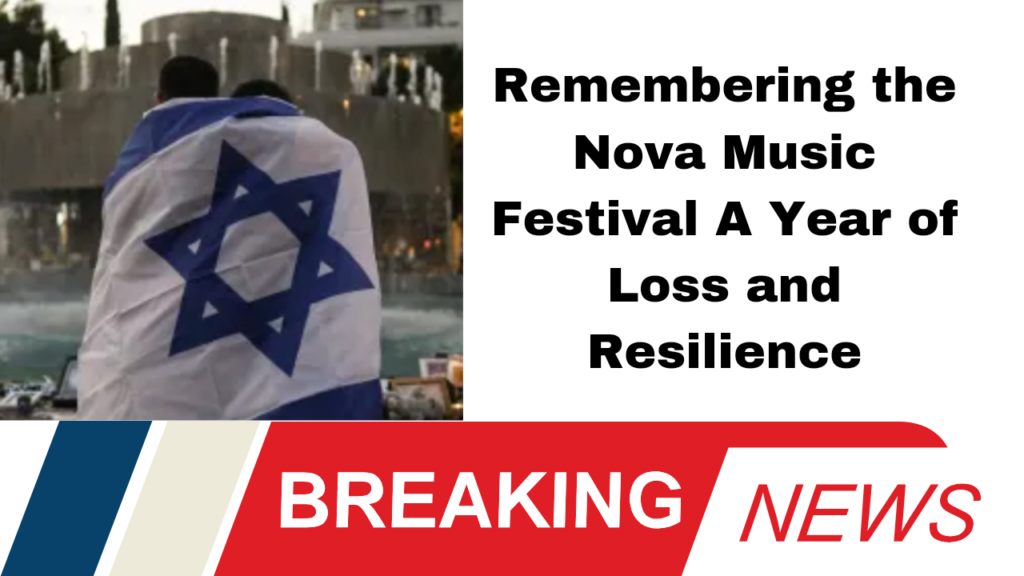At 6:29 a.m. on the anniversary of the horrific October 7 attacks, silence enveloped the Nova Music Festival site in the Negev Desert, abruptly shattering the memory of a night filled with music and celebration. Screams pierced the air, echoing the terror that unfolded a year prior when Hamas terrorists stormed the festival, leading to one of the deadliest assaults in Israel’s history.
The Tragedy Unfolds
The attacks on the festival shocked the world. As attendees danced, armed militants ambushed the gathering, blocking escape routes and launching a brutal onslaught. Reports detail how victims were shot at point-blank range, trapped in their vehicles, or caught while trying to flee. In total, 347 people lost their lives that day, with many more taken hostage, marking a grim chapter in the ongoing conflict.
A Place of Mourning and Remembrance
The site of the massacre has since transformed into a somber memorial, now dotted with hundreds of cenotaphs. Each tribute honors a victim, including Amit Itzhak David, a 23-year-old who had just returned from a celebratory trip to South America. Family members gathered to commemorate him, their grief palpable in the air.
“It’s too difficult to be here and see all of this,” said his cousin Inbar Parnassa, reflecting the profound sorrow that blankets the families affected.
The Unfolding Aftermath
As the anniversary unfolded, the shadow of ongoing conflict loomed large. The Israel Defense Forces (IDF) continued airstrikes in Gaza, targeting Hamas, while more than 41,000 Palestinians have reportedly lost their lives in the ensuing war. The humanitarian crisis in Gaza has reached catastrophic levels, with nearly all of its 2.2 million residents displaced.
Even as memorials took place across Israel, the threat from Gaza persisted, with rocket fire injuring two people on the same day. This underscored the reality that, despite a year of intense conflict, danger remains ever-present.
Stories of Loss and Resilience
At a memorial in Kibbutz Nir Oz, community members shared their stories of loss. Daniel Lifshitz remembered his friend Dolev Yehud, a volunteer medic who died while trying to help others during the attack. “Time stopped here,” Lifshitz said, emphasizing the lingering trauma felt by the community.
Adina Moshe, a survivor who witnessed the murder of her husband during the attack, echoed similar sentiments. Her pleas for justice and the return of those still held hostage have become a rallying cry for many families.
As grief filled the air, political frustrations bubbled to the surface. Family members of hostages marched to Prime Minister Benjamin Netanyahu’s residence, demanding action. The intersection of personal tragedy and national politics has sparked protests, reflecting widespread dissatisfaction with the government’s handling of the crisis.
Jonathan Shimriz, whose brother was taken hostage and later killed in Gaza, called for a state inquiry into the situation. His words resonated with many who feel that their loved ones’ fates are inextricably linked to political decisions.
As Israel commemorates the one-year anniversary of the October 7 attacks, the echoes of grief and resilience are undeniable. While the wounds remain fresh, there is a collective hope for healing, justice, and the safe return of all hostages. The tragic events of that day serve as a stark reminder of the ongoing struggles faced by many and the urgent need for peace in the region.











More Stories
Netanyahu Under Fire as Leaked Documents Scandal and Hostage Crisis Deepen
Mount Fuji’s Snowless Peak A Sign of Climate Change and Japan’s Cultural Icon in Crisis
Malik Mumbai’s 15 Crore Monthly Income ‘Haar Meri Jeet Apki Offer’ for WBBL 2024 Your Guaranteed Win or Refund!